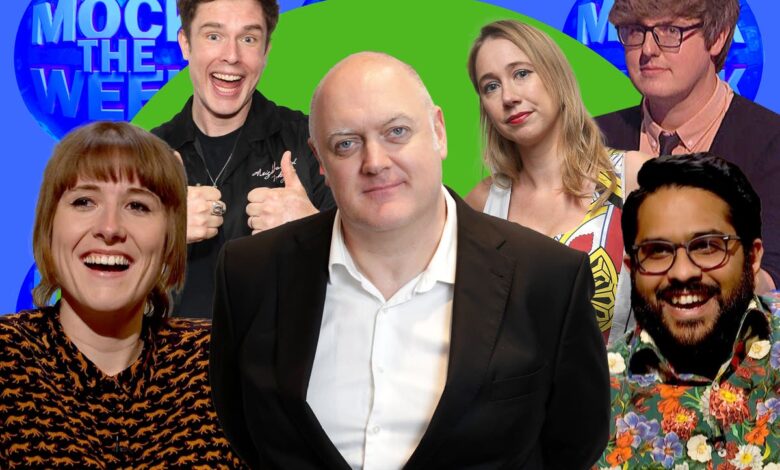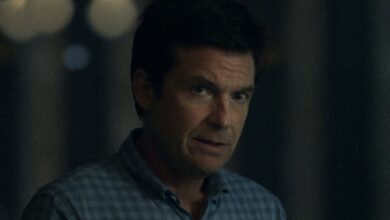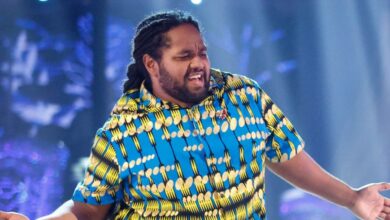From bearpit to a ‘baby comedian academy’: How Mock the Week launched the UK’s brightest comedy stars

Every year, there comes a point when the UK comedy industry suddenly becomes abuzz with whispers. Word gets about that the producers of Mock the Week are in town. They’re scouting out stand-up shows for new talent – and you could be next. “Everyone’s going, ‘You know they’re looking’,” comedian Maisie Adam tells me. “You suddenly ended up going to every gig feeling like you’re in those early episodes of X Factor, queuing up outside.”
When it was announced in August that the BBC was canning Mock the Week after 17 years, in order to “create room for new shows”, online discourse exploded. People questioned what the show ending in its current format (the team are optimistic it’ll find a home elsewhere) meant for the BBC, for the panel show format and for satire as a whole. But for comedians, the end of Mock the Week represented the loss of one of the few places in TV known to platform newcomers with little TV experience and, if they’re lucky, turn them into household names. Announcing the show’s cancellation, Dara Ó Briain, who’s been at the helm since Mock the Week’s inception in 2005, even called it “Dara and Hugh [Dennis]’s Academy for Baby Comedians”.
When Mock the Week was pitched to Ó Briain back in 2005, he tells me, it was as “a younger, spikier alternative” to Have I Got News for You. The political stuff was secondary to the comedy, with creator Dan Paterson saying it was designed as “a comedy show that used the news as our fodder”, rather than “a news show that happened to be a bit funny”. The week’s headlines were a jumping-off point for comics to flex their comedy and improv muscles, with additional rounds for stand-up and one-liners. For Ed Gamble, one of the most prolific panellists in recent years, “it was just a really good opportunity to see comics you’d not heard of before be very, very funny”.
It’s hard to believe that household names like John Oliver and Frankie Boyle were once considered plucky unknowns, but when Mock the Week started, they were the newcomers appearing alongside established comics like Hugh Dennis and Rory Bremner. Over the years, the producers aimed to keep up that balance between old and new. Russell Howard, Angela Barnes, James Acaster and Nish Kumar were among the early stage comedians to make one of their first TV appearances on the show and go on to stardom.
For the younger generation, this was the series they grew up aspiring to appear on, both for its prestige and its success stories. When comedian Eshaan Akbar booked his first episode in 2019, soon after the death of his mother, he felt a nostalgic sense of pride, “simply because it was something that I know about, non-comedy fans know about and my mum, who had no interest in comedy whatsoever, knew about”. It was a badge of honour… not to mention a handy marketing device. Gamble may have found a loyal fanbase with his podcasts, further TV appearances and tours, but to him “Mock the Week is still the thing that you want to put on a poster”.
But the pressure didn’t stop when you booked the gig. The nerves were immense, not helped by the murmurs of a not-so-pleasant filming atmosphere harking back to the early, male-dominated days on set. The same words are mentioned to me again and again; that of a “bearpit” or “elbow’s out” approach. London stand-up Tiff Stevenson had even heard it was “notoriously the most cutthroat of all the [panel] shows”. Ó Briain chuckles. “It wasn’t quite the kind of collaborative ‘yes, and’-ing each other that might be more of the case now.”
Early-era Mock the Week was dominated by four regular panellists (Hugh Dennis, Andy Parsons, Russell Howard, Frankie Boyle) and Ó Briain. Not only were there fewer open spots, but the regulars were fast and would arrive armed with prepared material, unafraid to trample over anyone in their way. As a comedian himself, Ó Briain didn’t find it particularly fun either. “I was very close to knocking it on the head more than once, going, ‘All I’m doing is pressing a buzzer here’,” he tells me. “If anything, this is badly representing me, this show… because there’s no chance to get in.”
Mock the Week’s masculinity machine ended up feeding itself. There were many, many men-only episodes but, as Paterson points out, “there was a period where some women would come on and maybe it was very aggressive and so male dominated that they just didn’t say anything and that didn’t look good either”. Adam, the show’s second most-booked female comic (with just 15 out of 174 live episodes under her belt), agrees it was difficult for women to make themselves heard. “I mean, it was a lot of blokes, let’s be honest,” she says. “I don’t want to sound ‘all men’ here, but when you run a show with all men on, it is probably going to be more alpha and combative… to get your words in.”
In Paterson’s eyes, there simply weren’t female comedians on the circuit doing the “one-liner-y” kind of comedy they wanted, although Stevenson is more sceptical. “With the female comics, there was a lot of, ‘We’re not sure they’re ready’, which wasn’t necessarily being applied to the male comics,” she says. But in 2014, there was a shift. After years of criticism, the BBC promised that viewers would no longer see all male line-ups on panel shows. Stevenson’s first appearance on Mock the Week came that same year and she says she directly “benefitted” from the “rule”, even if it took her four years to appear alongside another female comic.
It was understandable that female comedians were frustrated, because the format offered something different to its panellists. Mock the Week only booked comedians with the sole purpose of being funny. On other panel shows, it felt like “comedian” and “TV personality” were being used interchangeably when it came to women (something Big Fat Quiz of the Year has been criticised for). “We’re not going up against other female comics to get a slot,” Stevenson says. “They’re happy to have someone from Love Island or Geordie Shore or Gogglebox.” Ó Briain agrees, and recalls telling Taskmaster creator Alex Horne that, on Mock the Week, “we only use stand-ups because it’s a very easy trap to fall into”. He pauses. “And it’s a very valid complaint. It’s incredibly irritating… I’ve done [Big Fat Quiz of the Year] about seven times and I’ve done it with a female stand-up comedian once, but usually it’s Davina McCall or someone.”
As the line-ups on Mock the Week began to diversify, so the atmosphere backstage shifted. The comedy still had edge (although maybe not quite as much as the early Frankie Boyle days of “Too Hot for TV” compilation DVDs), but the class of comics who came through the show were more considerate and collegiate in their approach. In fact, every panellist has a story about another comedian coming to them with guidance before their first episode. “It’s felt like one big dysfunctional family, really,” Adam says. “Like a really dysfunctional Succession.”
It couldn’t have felt further from that much-mythologised “bearpit” environment, and there was a clear sense of responsibility to pay it forward, too. Just as Acaster knocked on Edinburgh Fringe favourite Glenn Moore’s dressing room door to talk him through his first recording, Moore has continued that tradition. “It’s a show that can really get into your head in advance,” he says. “I mean, in most cases, there’s probably no useful advice I can give them. I always just thought it was nice when it happened to me, so it’s nice to do that for someone else.”
All the panellists tell me Ó Briain was instrumental in assuaging their fears, too. “Dara was always very keen to make sure people can get in and to give people a voice,” Paterson says. Akbar agrees. “I think he’s got the superpower of knowing how many times that person has spoken, and allowing them the space to say what they need to say,” he says. The Irish comedian is the conductor, an established part of the show’s furniture who’s unafraid to shush seasoned pros when they’re “waffling on” (Gamble’s words). First timers would always sit right by Ó Briain, Adam says, and he would “make sure that that person was heard by way of either gesture or bringing in, going, ‘Maisie, what did you think about this?’ or, ‘Hang on, let’s just go back to Maisie’s point here’. That’s so, so helpful.”
Ó Briain took the role seriously, although is far more self-effacing about how successful he was in his attempt to keep things even. “Whether that actually worked in practice, I don’t know. It was a nice aspiration,” he says. “People love the whole Frankie [Boyle], one-liner, bang-bang-bang stuff, but they are like jigsaw pieces that finish off the puzzle rather than allow another piece to be attached. I’m really the person who continues the middle of the chain, not ends it.”
When the panellists felt more comfortable on the show, bantered with each other and got to perform their own stand-up, audiences quickly became interested in them as individual comedians. “There were people who first got on and they’re playing 50 seaters, and by the time they leave, they’re playing big theatres,” Paterson says.
Clockwise from top left: Hugh Dennis, Milton Jones, James Acaster, Ed Byrne, Nish Kumar, Dara Ó Briain and Angela Barnes on the final series of ‘Mock the Week’
For Gamble, the surge in popularity was almost instantaneous. “I was surprised by how much of an impact my first appearance had,” he says. “I don’t think there’s many things around now that have that same impact, to be honest.” The day after Moore first appeared on the show, two strangers recognised him on the Tube and told him they thought he’d been great. “I was like, ‘Oh my god, this is my life now’, and then I didn’t get recognised again for another two years,” he says.
As a result, there’s a bittersweet feeling to the show ending. No one can deny that Mock the Week had a good run, but with it will go one of the last opportunities for comics to show both their stand-up skills and personalities on screen. “It feels like there are less and less spaces to do that, which is a shame,” Stevenson says. There’s an understandable frustration in Moore’s voice as he discusses that lost potential. “I think the BBC has a responsibility to replace it with a show that would offer the same chances to emerging comics,” he says. “Whatever [replaces it] needs to be providing opportunities to minimum two new comedians per week.”
For now, Ó Briain chooses to take the BBC’s commitment to replace the series at face value. “The stated reason – and I accept this reason because it also compels them to do this – is that we can’t do a new show until we get rid of one of our existing ones,” he says. “So you go, ‘Fine, now you have to do a new show’, because there is a generation… of people who deserve their vehicle and their chance to be the next ones to burst through.” You can hear the determination in his voice. “I’m presuming that the reason they got rid of us is also a promise that they will definitely do another show, so they better.”
The last episode of ‘Mock the Week’ airs on Friday 21 October at 10pm on BBC Two
It’s felt like one big dysfunctional family, really. Like a really dysfunctional Succession
I think the BBC has a responsibility to replace Mock the Week with a show that would offer the same chances to emerging comics





